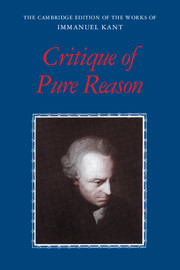Chapter III - On the ground of the distinction of all objects in general into phenomena and noumena (as in the second edition)
from Book II - Analytic of principles
Published online by Cambridge University Press: 05 July 2013
Summary
We have now not only traveled through the land of pure understanding, and carefully inspected each part of it, but we have also surveyed it, and determined the place for each thing in it. But this land is an island, and enclosed in unalterable boundaries by nature itself. It is the land of truth (a charming name), surrounded by a broad and stormy ocean, the true seat of illusion, where many a fog bank and rapidly melting iceberg pretend to be new lands and, ceaselessly deceiving with empty hopes the voyager looking around for new discoveries, entwine him in adventures from which he can never escape and yet also never bring to an end. But before we venture out on this sea, to search through all its breadth and become certain of whether there is anything to hope for in it, it will be useful first to cast yet another glance at the map of the land that we would now leave, and to ask, first, whether we could not be satisfied with what it contains, or even must be satisfied with it out of necessity, if there is no other ground on which we could build; and, second, by what title we occupy even this land, and can hold it securely against all hostile claims. Although we have already adequately answered these questions in the course of the Analytic, a summary overview of their solutions can still strengthen conviction by unifying their various moments in one point.
Information
- Type
- Chapter
- Information
- Critique of Pure Reason , pp. 354 - 365Publisher: Cambridge University PressPrint publication year: 1998
